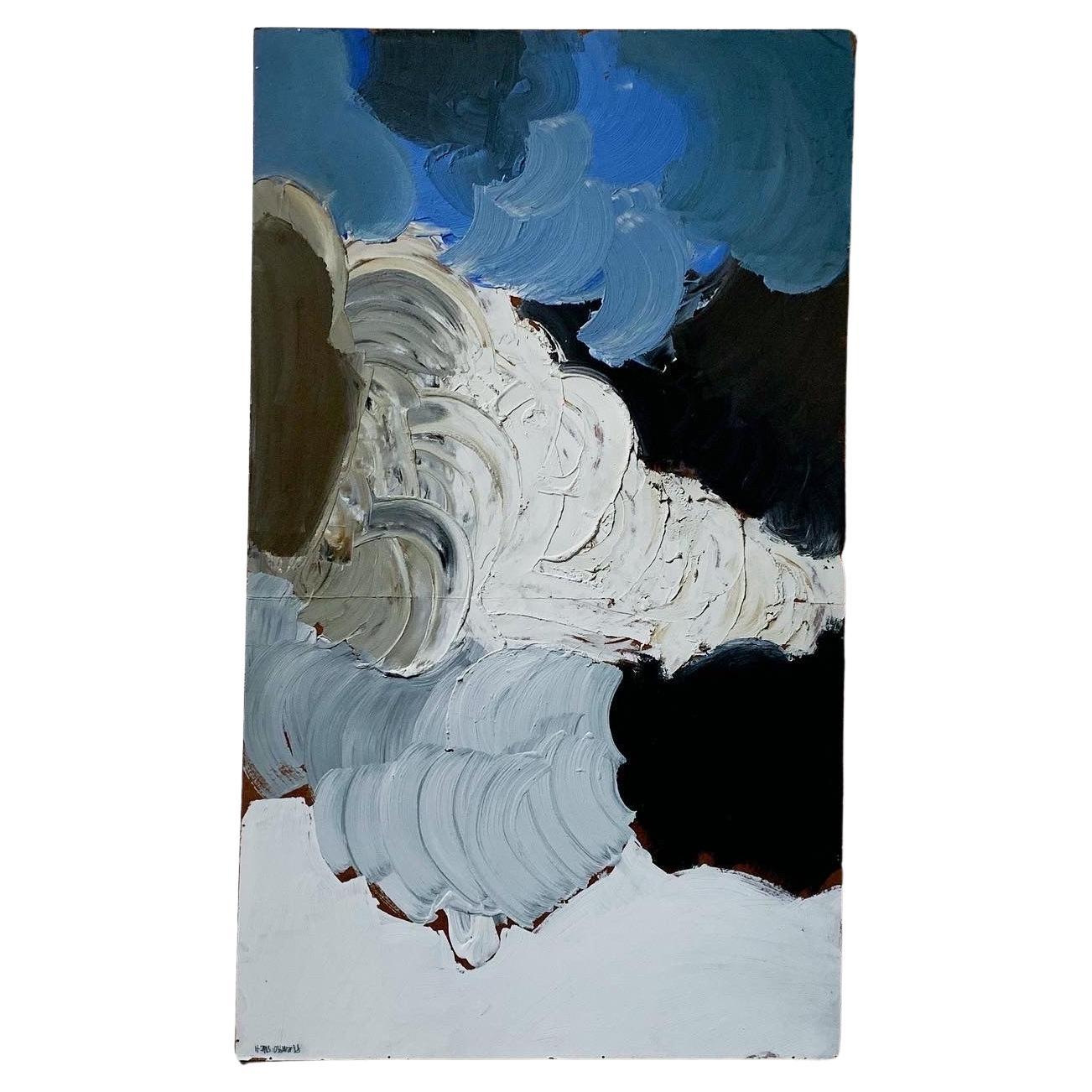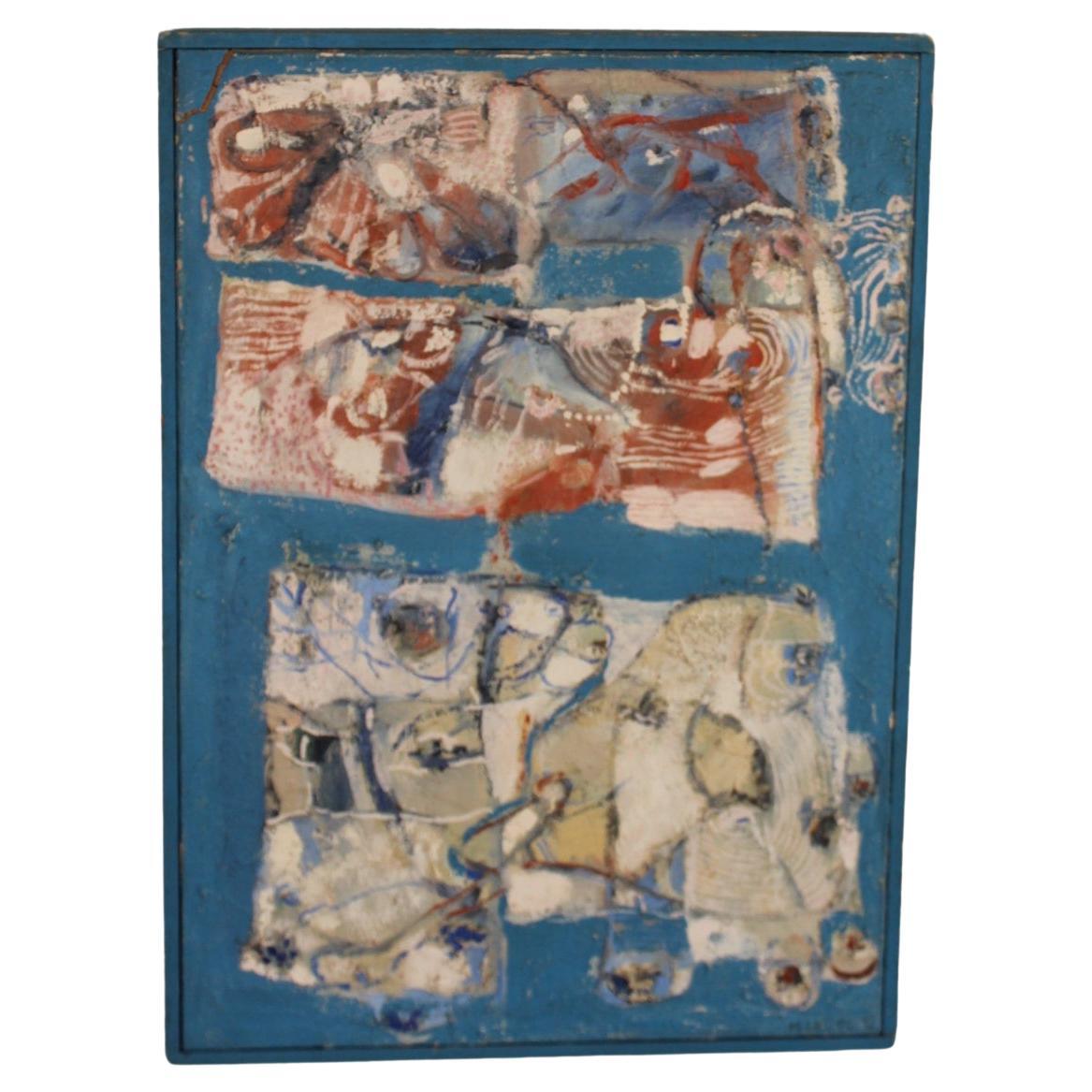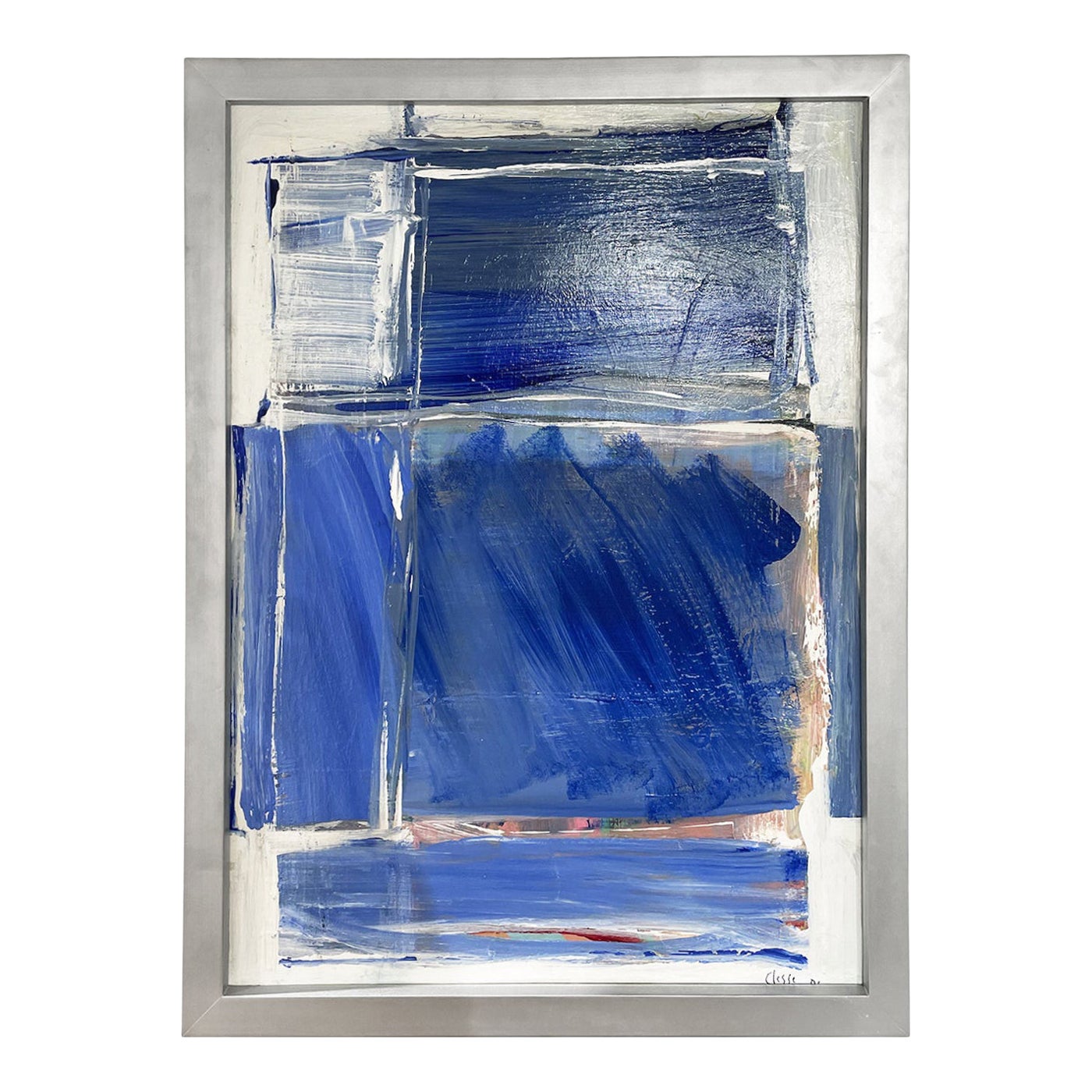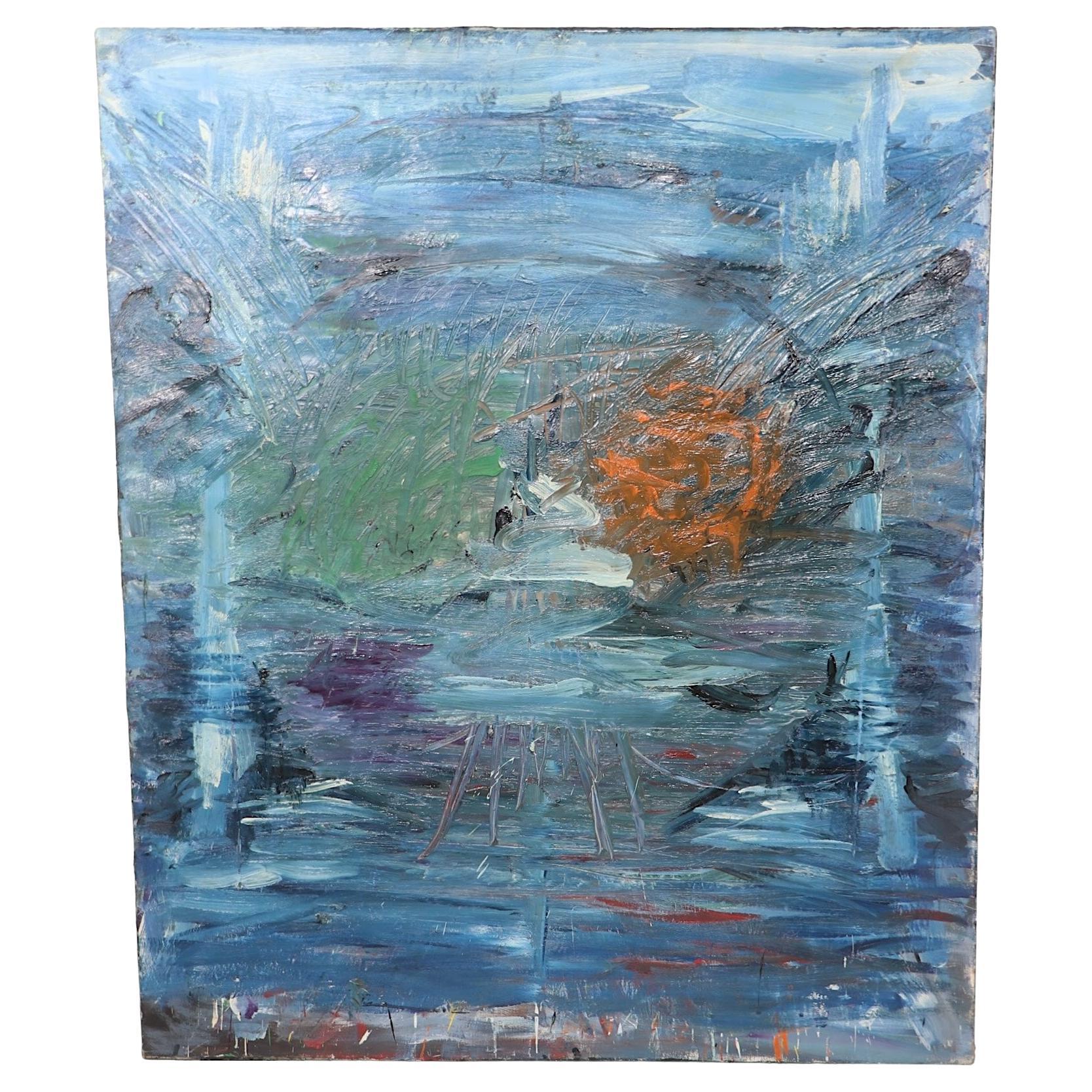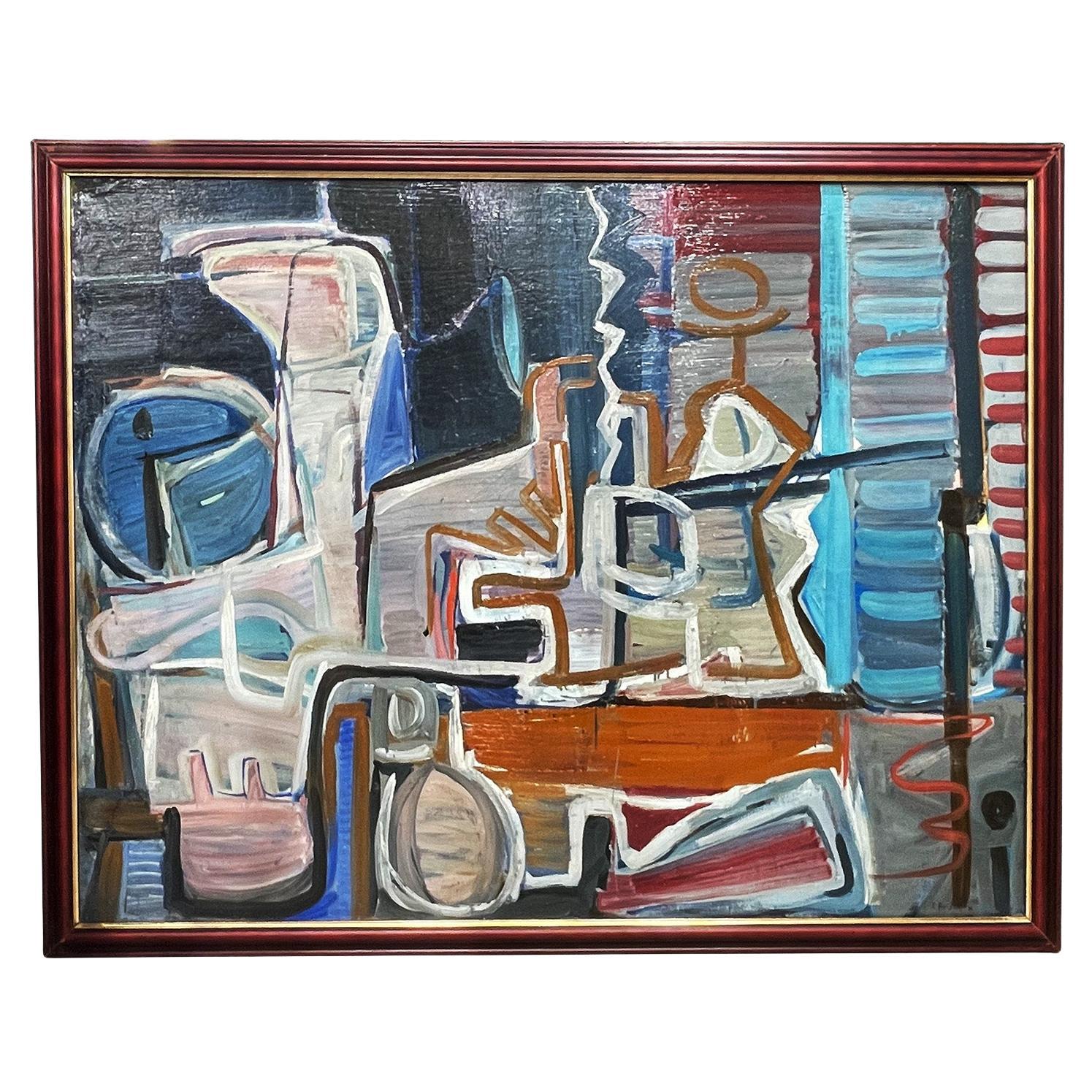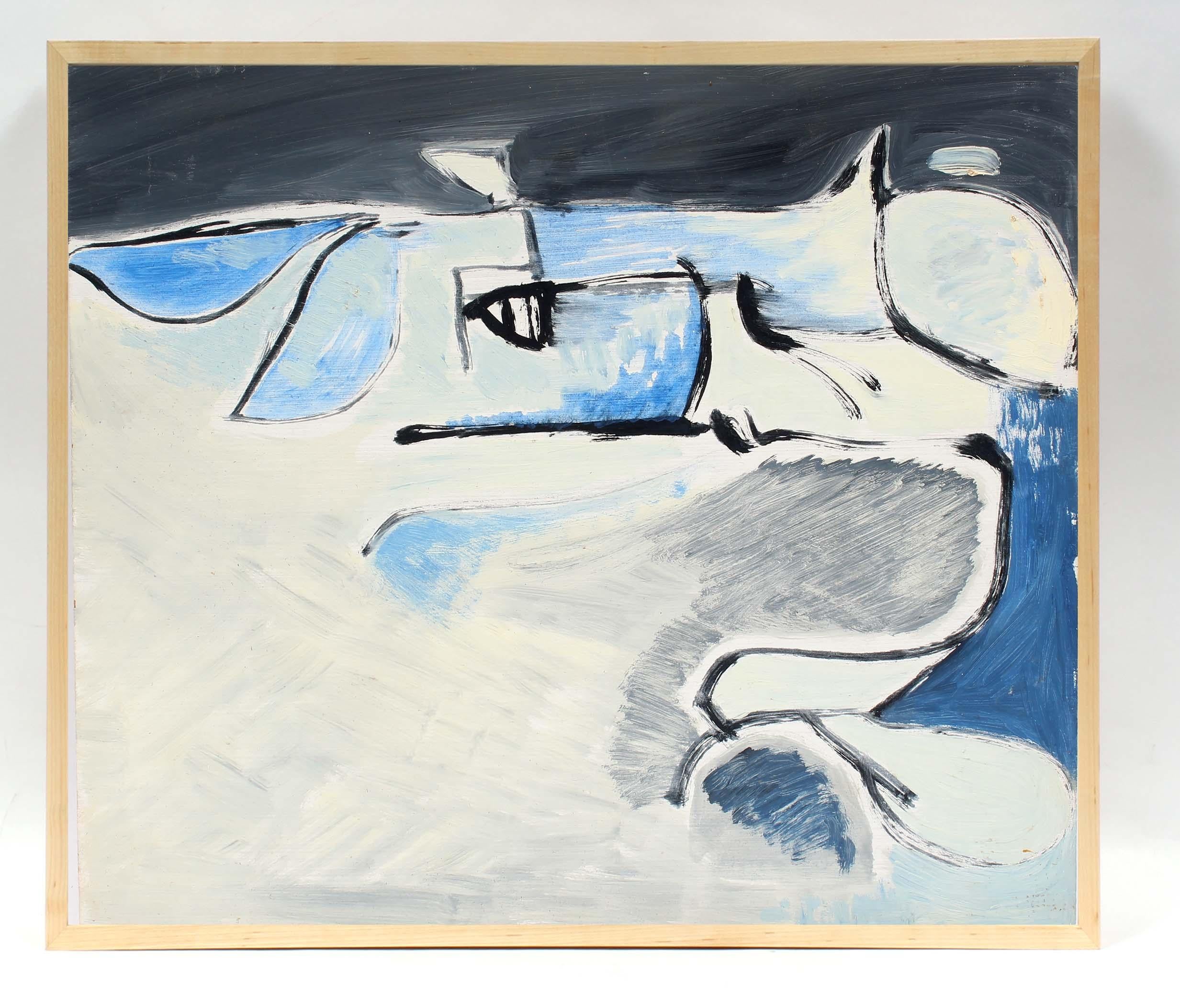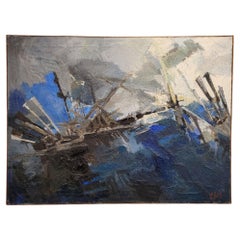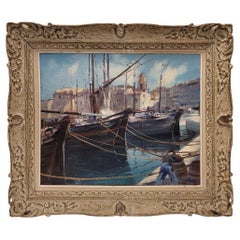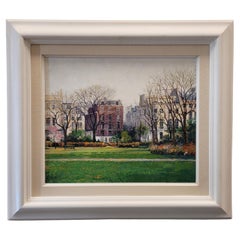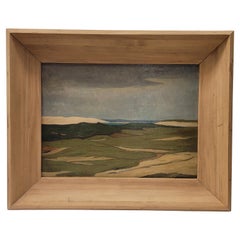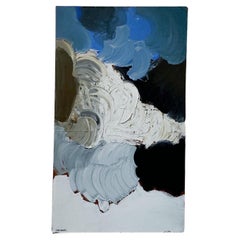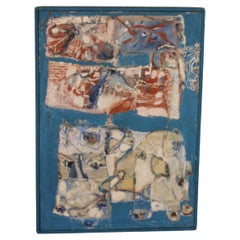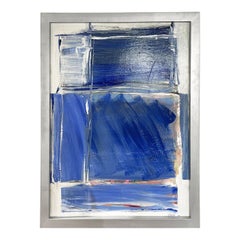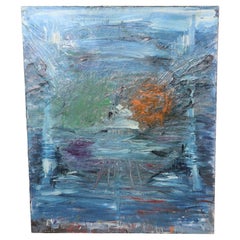Items Similar to Oil on canvas Spain Abstraction Blue gray “Children's Islands” Esteban de la Foz
Video Loading
Want more images or videos?
Request additional images or videos from the seller
1 of 22
Oil on canvas Spain Abstraction Blue gray “Children's Islands” Esteban de la Foz
$5,822.98
£4,334.83
€4,860
CA$7,976.02
A$8,871.08
CHF 4,632.20
MX$107,951.60
NOK 59,160.29
SEK 55,481.91
DKK 36,997.48
Shipping
Retrieving quote...The 1stDibs Promise:
Authenticity Guarantee,
Money-Back Guarantee,
24-Hour Cancellation
About the Item
An exceptional and one of a kind large-format work by Esteban de la Foz, undoubtedly the most representative and influential figure in abstract art in Cantabria. Titled "Children's Islands" and dated 1996, this work falls within the artist's period of experimentation and maturity, characterized by dynamic compositions and gestural, intuitive brushstrokes. During this period, he also introduced elements inspired by nature and the landscape, with series such as "Islands and Coasts," to which this work belongs.
He employs a sober color palette, with grayish tones in which the black, blue, and greenish brushstrokes stand out, without much contrast. The artist plays with textures through highly material brushstrokes, laden with pigment, leaving a relief on the canvas suggested by each of his strokes. He often made his own pigments so he could manipulate their density and play with how they would act on the support. It is a painting with very defined strokes that allows the viewer to be transported to the creative process of the piece, intuiting its movements and rhythm.
Esteban Pérez de la Foz (Santander, 1928-2007)
Esteban de la Foz is the artistic name of Esteban Pérez de la Foz Fernández, an abstract painter born in Santander on April 4, 1928. He showed an early inclination toward art. His first contacts with drawing and painting were self-taught, without appropriate academic training. His style evolved steadily and consistently throughout his career, reflecting his artistic restlessness and openness to contemporary trends. Five stages can be identified in his work, each with its own characteristics:
The first stage took place around the 1950s, his early years, characterized by late Cubist figuration and Neo-Cubism, with urban landscapes and subjective portraits rendered with strong lines and faceted planes. Initially, the most influential painters he admired were Velázquez and Goya, until he became acquainted with the work of his fellow countryman, Pancho Cossío. It was then that he decided to make a clean slate. He held his first exhibition at the Galería Sur in Santander in 1954. He obtained a scholarship from the Ministry of Education (1957) and settled in Paris, at which point he began to develop an expressionism linked to an underlying Cubism. His color palette during this period is sober, reflecting a structured and rational vision of reality, and experimenting with materials and textures.
His second period (late 1950s and 1960s) is characterized by the influence of his time in Paris and his training at the École du Louvre and the Atelier de la Grande Chaumière. His work begins to evolve toward a more abstract formal synthesis. He becomes interested in orderly composition and the interplay of impasto. His Constructivist cityscapes evolved toward large fields of color and geometric forms, anticipating his transition to abstraction.
In his third phase (1960s and 1970s), marked by Abstract Expressionism and social criticism, his painting took on a much more expressive character, with increasingly broad brushstrokes and vibrant colors. Many of his works from this period are charged with social criticism or reflect a strong existentialist tone.
The 1980s and 1990s are considered his period of experimentation and maturity. During this period, some of his works bordered on minimalism, without losing expressiveness, through dynamic compositions and motifs inspired by nature and the landscape. After more than ten years of working in total abstraction, in 1985, influenced by American Abstract Expressionism and German Neo-Expressionism, he developed a series of paintings that were abstract in form, yet somehow maintained figuration, with titles meant to "guide" the viewer by indicating what they should see. This is precisely what happens with "Puerile Islands."
His fifth and final stage (1990s and early 2000s) represents the culmination of his style and his path toward abstraction. He achieves a synthetic expressionism, with rich brushwork and intense, yet always balanced, colors. A musical influence is evident in the rhythm and structure of his later works. His preferred color palette is sober; large patches of intense color are rarely found in his works, and always as a resource to provide a greater dramatic component. In his latest exhibitions, he maintains his signature style: a dialogue between form, color, and emotion, with a strong mastery of oil paint and composition.
With more than 40 solo and group exhibitions, he has established himself as a key figure in contemporary Spanish art. His career traces a path from early informalism to abstraction. Around 1970, he found his most distinctive style, characterized by a complete liberation from figuration, masterfully experimenting with medium and pigments.
Technical details
Support technique: Oil on canvas
Title of the work: “Children's Islands”
Author: Esteban de la Foz
Signed in the lower right corner and on the back
Style: Abstraction
Year: 1996
Country of origin: Cantabria, Spain
In good condition considering its age and use
Dimensions: 165 x 155 cm
- Creator:Spanish Manufactory (Artist)
- Dimensions:Height: 64.97 in (165 cm)Width: 61.03 in (155 cm)Depth: 0.79 in (2 cm)
- Style:Mid-Century Modern (Of the Period)
- Materials and Techniques:
- Place of Origin:
- Period:1990-1999
- Date of Manufacture:1996
- Condition:Wear consistent with age and use.
- Seller Location:Valladolid, ES
- Reference Number:1stDibs: LU2943344170342
About the Seller
4.7
Gold Seller
Premium sellers maintaining a 4.3+ rating and 24-hour response times
Established in 1990
1stDibs seller since 2017
159 sales on 1stDibs
Typical response time: <1 hour
- ShippingRetrieving quote...Shipping from: VALLADOLID, Spain
- Return Policy
Authenticity Guarantee
In the unlikely event there’s an issue with an item’s authenticity, contact us within 1 year for a full refund. DetailsMoney-Back Guarantee
If your item is not as described, is damaged in transit, or does not arrive, contact us within 7 days for a full refund. Details24-Hour Cancellation
You have a 24-hour grace period in which to reconsider your purchase, with no questions asked.Vetted Professional Sellers
Our world-class sellers must adhere to strict standards for service and quality, maintaining the integrity of our listings.Price-Match Guarantee
If you find that a seller listed the same item for a lower price elsewhere, we’ll match it.Trusted Global Delivery
Our best-in-class carrier network provides specialized shipping options worldwide, including custom delivery.More From This Seller
View AllSwiss painting Bleu“The Battle of Salamine” by Hugo Cleis, abstraction
By Hugo 'go
Located in Valladolid, ES
One of a kind painting by the Swiss artist Hugo Cleis. Cleis began his artistic career with Swiss Expressionism, which featured social content, although in the mid-1940s his work fo...
Category
Vintage 1940s Swiss Mid-Century Modern Paintings
Materials
Canvas, Paint
Gabriel Deschamps French Oil on canvas “Saint Tropez”
By Gabriel Deschamps
Located in Valladolid, ES
Technique on stand: Oil on board
Title of the work: "Saint Tropez"
Author: Gabriel Dechamps (1919 – 2011)
Signed in the lower right corner
Period: Se...
Category
Vintage 1970s French Mid-Century Modern Paintings
Materials
Wood, Paint
$2,731 Sale Price
52% Off
Painting" St. James’s Park, London”, Josep Mª Vayreda Canadell signed
By Spanish Manufactory
Located in Valladolid, ES
Amazing and Exquisite view of Saint James's Park, a charming British park located in the Westminster area of central London. It is the oldest of the city's Royal Parks. The horizon...
Category
Vintage 1970s Spanish Modern Paintings
Materials
Canvas, Paint
French painting "Mountain Landscape”, Madeleine Doillon -Toulouse
By Madeley
Located in Valladolid, ES
This gorgeous work by the French artist Madeleine Doillon-Toulouse presents a mountain landscape with an expressionist aesthetic. The expressionist landscape does not faithfully rep...
Category
Vintage 1940s French Mid-Century Modern Paintings
Materials
Wood, Paint
$2,185 Sale Price
29% Off
Korea Etching by Deok Sung Kang, numbered 75/75
By Duck Shin
Located in Valladolid, ES
Gorgeous Etching, with aquatint and color matrix by the South Korean artist Deok Sung Kang, made around 1990. The works of this artist, although they tend towards abstraction, are really inspired by nature. They illustrate a very personal vision of everyday objects and phenomena. The creative brilliance of this artist is widely recognized.
In this case, the work is divided into two areas, the first of which is dominated by a red color, which represents a pair of red roses using a rather realistic technique. However, in contrast, a larger area of intense blue inspired by natural motifs and splashed with a red spot.
About the artist
Deok Sung Kang is a painter and printmaker of South Korean origin. He studied Fine Arts in his native country, although he later attended the École de Beaux Arts in Paris and, later, in 1989, he settled in Madrid, where he continued his studies at the Complutense University of Madrid. The highlight of his facet as a painter are his prints, often using rice paper as a support.
Most of his works have been exhibited at fairs and exhibitions in Spain, but he has also done some in his country, such as at the Art Museum in Seoul.
About the technique
The origin of prints in Asian art has its foundations in the knowledge of printing texts on woodblocks, around the 8th century. Over time, it evolved and this new art became accessible to the majority of the public, opening the doors to the enjoyment of art and collecting, which until then was limited only to merchants, rich warriors...
Gprgeous Etching is a type of engraving, which is made using a metal plate (iron, zinc or copper) as a base, which is covered with a light layer of a protective varnish or acid-resistant wax. The engraver draws with a stylus on the layer of varnish, reaching just up to the metal plate. Later, the plate is dipped in etching, hence its name, a solution based on water and nitric acid, which corrodes the copper in the areas where it was not protected by the varnish. The immersion time is what determines the depth of the line.
Metal plates engraved with this technique can be printed with the desired ink colour, prepared by combining various pigments and binders.
Beautiful work of art by the contemporary Korean artist Duck Sung Kang...
Category
1990s Korean Mid-Century Modern Paintings
Materials
Paper
$747 Sale Price
20% Off
France Oil on panel “Marina”, French School
By French House & Garden
Located in Valladolid, ES
Exceptional painting depicting a Mediterranean seascape. The two fishing boats in the center of the composition stand out. In the far distance, a village with a small harbor, charact...
Category
Antique Early 1900s French Beaux Arts Paintings
Materials
Wood, Giltwood, Paint
You May Also Like
Oil Paint with Blue Shades by Hans Osswald, 1964
Located in Forest, BE
This must be one of Hans Osswald best works. We have several in our collection. The artwork is painted on a wood panel. Lots of texture, relief and movements. Some traces of time on the art work. Still very nice. Signed on bottom.
Hans Osswald 1919-1983
Hans August Osswald (originally Andersson) was born on 29th August 1919 in Örebro. He was a Swedish painter and book illustrator.
Osswald first exhibited at Louis...
Category
Vintage 1960s Swedish Scandinavian Modern Paintings
Materials
Reclaimed Wood
Midcentury Italian Abstract Blue Painting
Located in Seaford, GB
Midcentury Abstract Blue Painting Signed and dated 1972
Midcentury Abstract Blue Painting The Italian abstract art scene of the 1970s was transformativ...
Category
Vintage 1970s Spanish Mid-Century Modern Paintings
Materials
Acrylic
$1,370 Sale Price
20% Off
20th Century Light-Blue French Abstract Painting by Daniel Clesse
By Daniel Clesse
Located in West Palm Beach, FL
A French light blue white abstract painting oil on wood by Daniel Clesse, painted in France, signed and dated in 1991.
Without the frame:...
Category
Late 20th Century French Mid-Century Modern Decorative Art
Materials
Canvas, Wood, Paint
Large Abstract Mid Century Painting by Jules Granowitter c 1950/1960's
Located in New York, NY
Large abstract acrylic painting by noted NYC artist Jules Granowitter. The painting is mainly executed in tones of blue with orange, purple, green, gray and red also visible. Nice b...
Category
Mid-20th Century American Mid-Century Modern Paintings
Materials
Canvas, Acrylic
20th Century French Modern Abstract Vintage Oil Painting by Christiane Bastide
Located in West Palm Beach, FL
A light-blue, red vintage Mid-Century modern French abstract oil on canvas painting of a color composition, painted by Christiane Bastide in good condition. Singed on the lower right...
Category
Mid-20th Century French Mid-Century Modern Paintings
Materials
Canvas, Wood
Abstract Expressionist Painting American Late 1960's Mid Century New York Blue
Located in Buffalo, NY
Mid Century Modern, American Abstract Expressionist Painting on Masonite.
This wonderful work in hues of blue comes house in a contemporary natural wood frame presentation..
The ar...
Category
1960s Abstract Expressionist Abstract Paintings
Materials
Acrylic, Masonite
More Ways To Browse
Asian Painted Plate Black
Asian Wooden Bowl
Asprey Leather
Bone Inlaid Chest
Brass Brazier
Breakfront Desk
Brittany Pottery
Bronze Pegasus
Buddha Shakyamuni
Carved Coconut
Cast Bronze Buddha Head
Cast Glass Stool
Cathedral Crown
Century French Fireplace Clock
Chinese Ceramic Statues
Chinese Soapstone Carving
Chippendale Pulls Antique Brass
Chippendale Secretary
